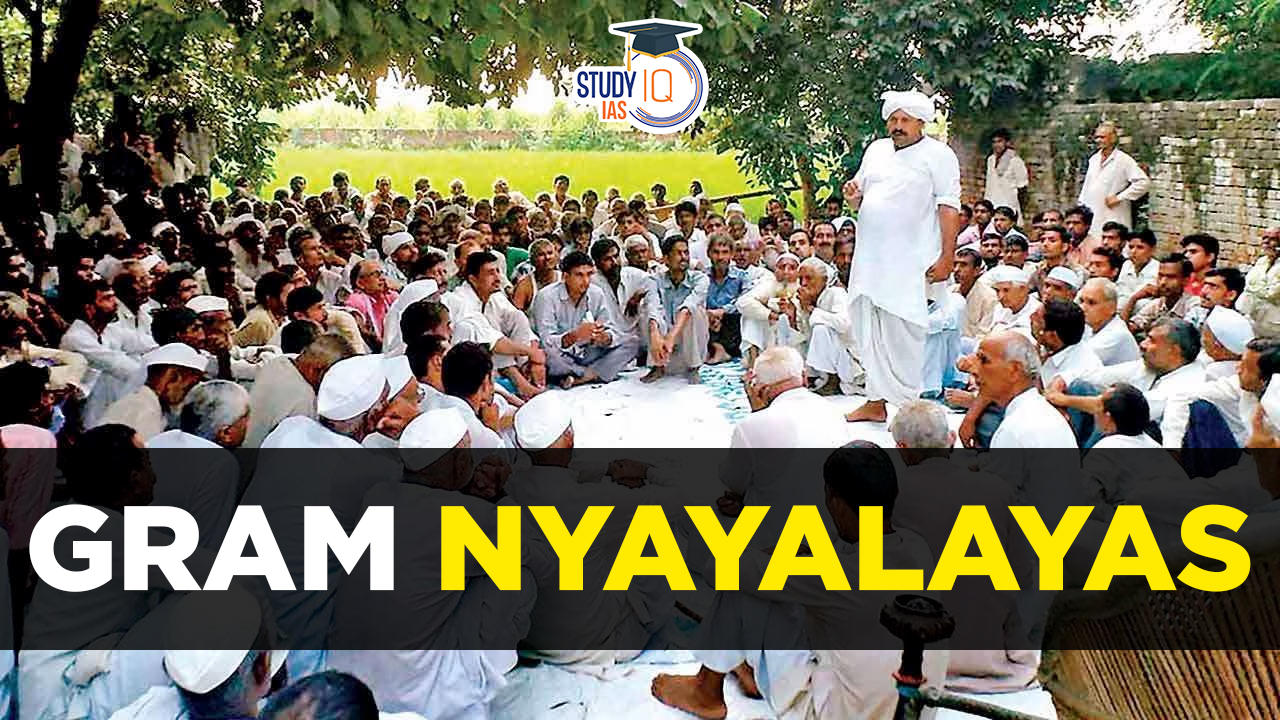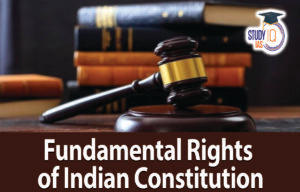Table of Contents
Gram Nyayalayas
Gram Nyayalayas are village courts in rural areas that give citizens of India instant access to the court system. The Indian Constitution’s Article 39-A requires that those in need and the weaker segments of society receive free legal representation. Gram Nyayalayas, which is covered in this article, is covered in the Indian Polity and Governance of UPSC Syllabus. Students can also go for UPSC Mock Test to get more accuracy in their preparations.
Gram Nyayalayas History
Since before independence, there have been Nyaya Panchayats, or village tribunals, where disputes between peasants are resolved. In ancient India, village elders or other respected individuals recognized for their honesty and integrity helped communities resolve their conflicts peacefully.
Numerous Alternative Dispute Resolution (ADR) procedures have been incorporated into the legal system in order to enable quick justice in response to the growing concern over court backlogs that are causing unjustified delays in the administration of justice. The Arbitration and Conciliation Act of 1996’s processes are helpful in avoiding the intricate court proceedings, but they are nonetheless expensive and out of the grasp of local populations.
The effectiveness of Lok Adalats, presided over by retired judges, in delivering prompt justice to rural communities at opportune periods was also lacking. In order to provide swift justice and save costs for the official judiciary, which spends time and resources processing a lot of disputes of lower seriousness, it is seen vital to devolve some judicial powers to a village-level authority.
As a result, the Gram Nyayalayas Act, 2008 was passed to establish Gram Nyayalayas, the country’s lowest level of the judiciary for rural communities, at the block level.
Gram Nyayalayas Functions
Its goal is to provide justice to those who are destitute and at their door. It aspires to establish Gram Nyayalayas in rural areas to offer swift, reasonably priced, and significant justice to the people of rural areas. According to Article 39A of the constitution, the state is required to ensure that the functioning of the legal system promotes justice on the basis of equal opportunity and shall provide free legal aid to ensure that no citizen is denied the opportunity to obtain justice due to their financial situation or other disabilities.
By streamlining the procedural regulations and introducing several options for alternative conflict resolution, like arbitration, conciliation, and mediation, it seeks to strengthen the court system. Generally speaking, the Gram Nyayalaya statute of 2008 is founded on the recommendations of the law commission.
Gram Nyayalayas Features
The Gram Nyayalayas shall be the first-class judicial magistrate court, and the state government shall appoint the court’s presiding officer (Nyayadhikari) after consulting with the High Court. Every intermediate level and panchayat will have a Gram Nyayalaya. The Gram Nyayalaya will be a travelling court that has both civil and criminal jurisdiction.
The headquarters of the intermediate panchayat will house the Gram Nyayalayas’ office; they will travel to the villages to do business and work there. Criminal trials as well as civil lawsuits, claims, and disputes are tried by the Gram Nyayalaya. The Gram Nyayalaya will exercise civil court authority with few adjustments and will adhere to the act’s specific procedure.
The Gram Nyayalaya will use the conciliation that will be designated for this purpose to try to mediate the disputes as much as feasible by bringing the parties to conciliation. The Gram Nyayalaya will follow natural justice principles and be bound by any rules issued by the High court.
An appeal must be made to the Court of Session in criminal cases, and it must be heard and decided within six months of the appeal being filed. In civil cases, the District Court is the proper venue for appeal, which must be filed and heard within six months after the appeal’s filing date. Anyone accused of a crime has the option to request a plea deal.
Gram Nyayalayas Act 2008
Gram Nyayalayas are intended to provide low-cost justice to residents of rural areas at their doorsteps. They are to be established for each intermediate Panchayat, or for a group of contiguous intermediate Panchayats, or for a group of contiguous Gram Panchayats. The seat of the Gram Nyayalayas shall be situated at the intermediate Panchayat’s headquarters.
The Gram Nyayalayas will try criminal cases, civil suits, claims, or disputes that are defined in the First Schedule and Second Schedule to the Act. The Nyayadhikari will make periodic visits to villages and may hear the parties and decide cases in locations other than its headquarters. They must adhere to a criminal trial’s summary procedure.
The Gram Nyayalaya shall not be bound by the rules of evidence provided in the Indian Evidence Act, 1872, but shall be guided by the principles of natural justice, subject to any rule made by the High Court. Disputes are to be settled as much as possible by bringing about conciliation between the parties, and for this purpose, the Gram Nyayalayas will use the conciliators to be appointed for this purpose.
Gram Nyayalayas Advantages
The Gram Nyayalayas, which are a component of the judicial reforms, are regarded as a crucial step in eliminating backlogs. Once Gram Nyayalayas are completely operational across the country, people won’t have to use the expensive and time-consuming lower or higher courts.
Gram Nyayalayas are intended to handle new litigation that will be settled within six months and will cut the number of cases pending in subordinate courts by around half. It work is to ensure that no citizen’s access to justice is restricted because of social, economic, or other limitations.
Gram Nyayalayas Issues
Only a small portion of disputes are resolved by Gram Nyayalayas; the majorities are appealed to District forums. They therefore do not help to lessen the administrative strain on District Courts. There are issues with jurisdiction as a result of the parallel presence of alternative conflict processes, tribunals, adalats, and other adalats. First Class Court Magistrates, Civil Judges (grade I or grade II), or, in a few rare cases, Chief court Magistrates who are already overburdened with their usual court work, rule over Gram Nyayalayas.
The existence of Gram Nyayalayas on the grounds of the district court is unknown to many stakeholders, including litigants, solicitors, police officers and others; also, no conferences or seminars have been organised to promote awareness of this institution. There are serious infrastructure and security issues.
Gram Nyayalayas UPSC
The Gram Nyayalaya Act’s preamble promises that no one would be denied access to justice because of a disability and sees citizens having access to justice at their doorstep. Therefore, the effectiveness of these institutions should be evaluated not only in terms of the number of courts that have been established in various states, but also in terms of their capacity to assist the most vulnerable members of society and their contribution to the overall decline in the number of cases that are pending. Students can read all the details related to UPSC by visiting the official website of StudyIQ UPSC Online Coaching.


 Lok Sabha Election 2024, Starts Form 19 ...
Lok Sabha Election 2024, Starts Form 19 ...
 Fundamental Rights of Indian Constitutio...
Fundamental Rights of Indian Constitutio...
 BR Ambedkar Birth Anniversary, Biography...
BR Ambedkar Birth Anniversary, Biography...

















